I'm not admitting to anything, but let's be honest, most of us download content on the Web from time to time. With copyright holders laying down the law more and more often, it can't hurt to do so with caution. And even if you aren't downloading copyrighted material, you still don't want companies snooping in on your online activities. So just how do you protect yourself when torrenting?
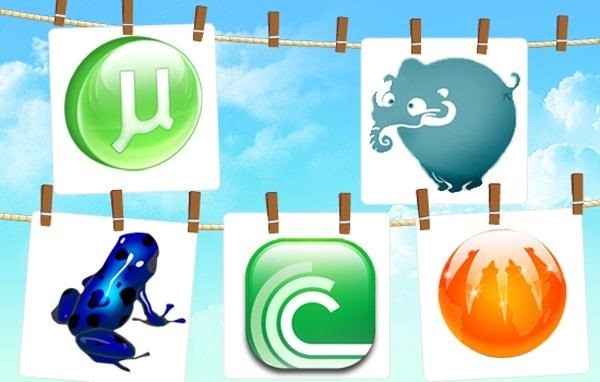
Avoid "Open Communities"
This is the first and easiest line of defense for your downloading habits. When you torrent, your IP is shared with a number of other users who help you to finish the file by sending you pieces of it that they've already downloaded. In turn, you send them back the pieces you have, and everyone ends up with a completed file in the end. Copyright holders looking to get their lawsuit on might join a download and log the IPs of everyone they come in contact with. Once they have your IP, they can contact your ISP which will lead them right to you.
Public trackers, such as The Pirate Bay, are where these phony downloaders go to mine for IP addresses. Because these sites don't verify anyone's identity, and there are no restrictions on what downloads you can join, it's next to effortless for a company to jump in and grab some IPs. Now obviously, because popular torrents might have thousands of people connected to it at any time, the odds of them choosing your IP to go after is slim, but why take the risk?

Private trackers such as Demonoid (now shut down) and BitMe provide an extra layer of protection by requiring users to register, and are often invite only to help keep those unwanted corporate presences. This might be a lot less convenient than browsing the public sites, but once you're in, the odds of getting caught go down significantly. And if you have any friends who download regularly, one or two of them might have some spare invites to go around.
Read the Comments
If you really can't scrounge up an invite to any of these private communities, the least you can do is check the files before you download. Almost every reputable torrent site has space for user comments on the download page. Always, always read these before putting any foreign files on your computer.
Not only is there the obvious and omnipresent virus threat, but some "clever" companies seed fake torrents holding tracking malware. Make sure to carefully scan the comments to see if anyone has found anything suspicious about the files, and if the torrent has no comments, it's probably your best bet just to avoid it.
Block Bad IPs
Here's where it gets slightly more technical. Because companies are joining in on downloads to grab IPs, their own IP addresses are also available. By downloading and installing a free program called PeerGuardian2, you can stay one step ahead of them by blocking known "bad" IPs from connecting to you.

It takes a little while to get it up and running, but the installation and setup walk you through the process. Their site occasionally goes down, so if the application isn't available through their official links, SourceForge hosts mirrors of it you can use in the meantime.
Cap Your Uploads and Don't Seed
This is probably the worst way to protect yourself, as it violates the "community spirit" of BitTorrent. But let's be honest, if it's between community spirit and a fat lawsuit, I'd rather err on the side of caution. Contrary to popular belief, corporations don't tend to target people downloading. They more often than not go after those uploading pieces of the file to others (seeding, in torrent terms). To avoid this, remove and delete the torrent from your system once the download is finished.
Because of the way the system works though, everyone downloading is also seeding at the same time. By capping your client's seeding bandwidth as well, you can effectively take yourself off the radar of many copyright holders. Every BitTorrent client is going to work a little bit differently, but for the most part, they all have the option to throttle your seeding limit to negligible amounts. Refer to your application's user guide for exactly how to do this.
Not quite sure what you're looking at when you're searching for torrents? Check out Null Byte's Guide to Torrent Acronyms. You can also download torrents more securely with I2PSnark or Anomos.
Just updated your iPhone? You'll find new emoji, enhanced security, podcast transcripts, Apple Cash virtual numbers, and other useful features. There are even new additions hidden within Safari. Find out what's new and changed on your iPhone with the iOS 17.4 update.



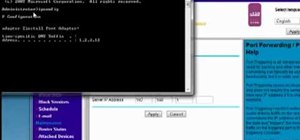


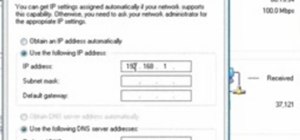


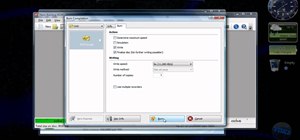
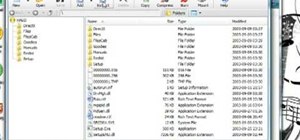




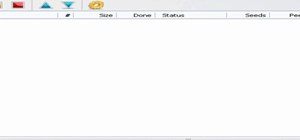
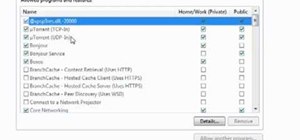

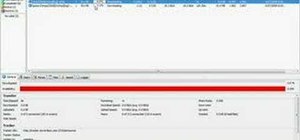
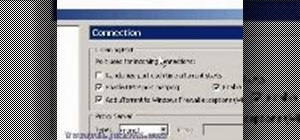



12 Comments
Nice guide, quite well written, kudos t you.
Thanks!
Nothing I hadn't already read before, but excellent job! It was very clear, concise and informative, a definite positive contribution to the community. Kudos! :)
answered all my questions
PeerGuardian is now old school. PeerBlock is the new program you can use to block over 700 million "bad ips". At the time I am typing this, Peerblock 1.2 is the latest release.
Say I create a torrent and only seed it for a short time and remove it from uTorrent. Can that torrent be traced back to me as the creator? For instance, if I create it and lots of people download and reseed it and I remove it, is my IP still attached as the creator of the torrent?
Depends how fast a tracker gets attached to it. You can share a torrent without without a public tracker. Like your client, uTorrent, you can create a private tracker (think of yourself as the tacker) and share the torrent / file with friends family or whatever - SO LONG as your IP does not change during the duration that you plan to sell it. uTorrent has the feature built in; an embedded tracker. Another option is to send the file to an uploader, through the method I just listed, FTP, split-file upload to rapidshare or similar site, MSN lol, the old direct connection from AIM... lol my point is that there are many ways to get a file to someone and then they can upload it for you. The upload would be in their username, but I'm sure they would attribute you by listing you as the original uploader / creator.
I prefer to split a file into a # of pieces. Some programs automate the process, others give more control; regardless a built-in hash or an included .sfv file will ensure that the individual pieces are not corrupted and that you are safe to begin the recombination. Depending on what you use to split the file will determine the simplicity of the rejoining process; does the user just run a .exe that recombines or do they have to download a simple file made for this process. It's simple and anyone with google skills (I mean common sense) can do a google search depending on what .XXX file extension you provided them with so don't worry about the process you use and it's likely you don't need to provide instructions as well. You can use 7zip (or another archiver most likely) to split files. 7zip you just proceed to add a file to archive, switch the format to .7z, then under the 'Split to volumes, bytes' set your desired 'piece' size. Very simple.
Is this the guide to how to bring down the p2p network? Thank you author, for being a giver of contradictory information (that you tell people how to stay safe; an act which will inevitably bring down the network) . Though your first three points are better (not so much with the second one - private companies get paid to set up trackers that appear normal), but your last point is seriously very dangerous and also selfish. You can't just leech. Sharing is the other half of the network; the balance to downloading; the yang of leechings ying;
If everyone right now stopped seeding, to save bandwidth or reduce chances of getting caught, there would be no p2p (peer 2 peer (TORRENT) network) ; it would literally cease to exist.
The reason why older things disappear or when you browsing for that thing you really want and it is nowhere to be found - but it should be or there is a FAT '0' under the seeders list, well, this is a symptom of both age and people not wanting to seed. Thankfully there is still a strong base of supporters out there that seed so long as something is relatively new ( ~2-5 years for most & ~2-8 for older stuff ) or highly in demand; without this minority group, there would not be a network whatsoever or it would be completely private with highly restricted access.
The majority of people download something then stop seeding - another example of said network ender.
ALL torrent client programs have a upload / download (seed / leech) ratio and you should at the bare minimum have a 1.0 ; that means the (x)GB you downloaded to your pc has been matched by you sharing the same amount. Some people have low upload rates other people need upload but there is always down time - turn that feature on while you sleep.
HINT - grab your upload speed rate from any speed test site, the first google result usually gives the result in Mbps (megabits per sec) so it needs a conversion to MB/s (megabytes per sec) - If you are not familiar you should definitely look it up; EASY TO FIND, GOOD TO KNOW. Once you know your upload speed, set your upload speed limit to anywhere from 10% (0.1) to 100% (1.0) with anything in between - (25% 50% 75%). Likely you will never use your upload speed, but the choice is up to you.
How bad do you wish that a multitude of variety will exist for the longest amount of time? If you are really scared, don't engage in illegal activities. Should be mentioned that there is a small percentage of legal, open source or closed programs and operating systems that participate on the p2p network all which is the main reason why the protocol has not been completely removed from the face of the earth - or sent down to the deep dark corners of 'the deep web'. Don't call it the dark web, that implies solely illegal activities when that is only an effect from a cause. The deep web is about anonymity. Like all good things, someone will find a way to exploit it.
You're cursing is entirely uncalled for, and unlikely to help get your point across. You'll probably even be banned soon, which won't help anyone read your information. Grow up.
Hey author.. You could also include the rather new service of cloud torrenting. A service will download your torrent for you, then you download it from them. So it will be no more than a browser download to your ISP; end result will look like you are downloading a big file. This middle man somehow is able to operate and keep you safe
I've been told that if one is accessing a torrent provider via a wireless connection to a public ISP (i.e. universities, coffee shop, some residential communities) rather than their own ISP, downloading and seeding will be tracked back to the wireless base, which has no way of knowing who is receiving the wireless signal... True?
Nice guide. Just be careful with the seeding options.. it may protect you in some respect but not seeding means killing the file... There are alternative to this which can work around this.
Share Your Thoughts